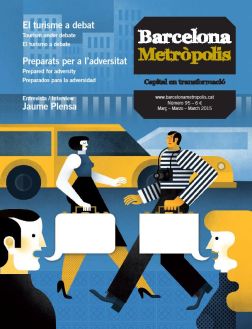Tourism now represents 15% of Barcelona’s GDP. This simple fact helps us to understand why the city’s model cannot be defined without taking this sector into account. The touristic image of Barcelona has developed since the 19th century between the push and pull of two antagonistic desires. One is involuntary, does not depend on locals and has been forged by the gaze of foreigners. The other, by contrast, is the image that the city wanted to show the world, from when it created the Commission to Attract Foreigners at the beginning of the last century until the 1992 Olympic Games. The Barcelona brand has largely been a result of the negotiation between these two perspectives, their own and that of the tourists.
Today tourism is such an important part of Barcelona that its excess could distort the city’s economic model. There are voices warning that the commoditisation of the Barcelona brand through an extractive logic could, in the long run, lead us to a predatory model of tourism and to an overdependence on the service industry. There are also those who question the economic value brought by tourism and the equitable nature of the distribution of wealth generated. In short, it is not possible to start a debate on the model of tourism without also proposing a serious debate about the city model. The Barcelona brand should be multi-sector and should be associated with areas like the knowledge society and innovation.
The Mayor of Barcelona, Xavier Trias, has put forward a significant local agreement for the management and promotion of responsible tourism. It is time to promote reflection that involves representatives of all relevant sectors in order to move forward in the definition of the tourism model of the future. The pact requires new approaches to management and for public institutions, businesses and all citizens in this community – including the temporary, adopted Barcelonians known as tourists – to do things in new ways.
- From the Rose of Fire to Gaudí. Joan de Déu Domènech
- Tourism as myth. Saida Palou Rubio
- The city face-to-face with itself. Lluís Rabell
- Finding the tourism to match the city model. Maria Abellanet i Meya
- My home, your home.Toni Sala
- There are only two tourism models: a good one and a bad one. Miquel Puig Raposo
- Future scenarios of tourism in Barcelona. José A. Donaire





Pingback: Quo Vadis Barcelona? | Núvol
Mucha gente se piensa que el turismo se expandio en barcelona gracias a los JJOO del 92 peró no es cierto el momento de eclosion fue en el siglo XX el turismo fue en parte del proyecto politico.
Hoy en dia barcelona se ha convertido en una ciudad con mayor afluencia de turista todo eso debido al siglo XX i tambien a los juegos olimpicos del 92 porque se tuvieron que construir muchos edificios… Para alojar a tantos atletas.